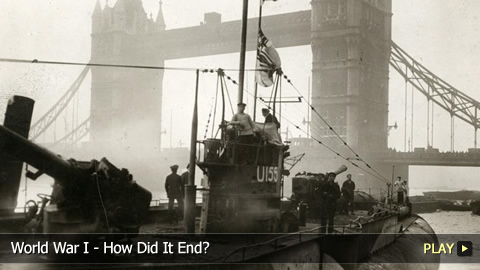World War I - How Did It End?

The Treaty of Brest-Litovsk
10 Video Game Franchises That Should NOT Have Gone Open World
Meanwhile, war efforts in Russia were growing unpopular. Their economy was near collapse, and food shortages lead to protest from civilians. These protests resulted in the abdication of Tsar Nicholas II, and the appointment of a provisional government. Seeing their army becoming increasingly ineffective on the Eastern Front, Vladimir Lenin and the Bolshevik party came to power, promising to pull Russia out of the war. On the third of March, 1918, Russia agreed to the Treaty of Brest-Litovsk, and ceded large portions of its land to Germany.
Moving West
What If Earth Suddenly Stopped Moving? | Unveiled
Now that the war was all but over on the Eastern Front, Germany could transfer their troops west. However, it was necessary to leave troops behind to occupy the large amount of acquired territory. This means the number of fighters was greatly reduced.
More Manpower
Top 10 Most Powerful Countries in the World in 2024
On the Western Front, the Allies were set to receive a massive boost of manpower and resources from the United States. In an attempt to end the war before this could happen, Germany pushed forward with the Spring Offensive of 1918. The Germans were initially successful, and moved to within 75 miles of Paris. However, they were unable to solidify these gains, and the advance was halted through the efforts of four Australian Imperial Force divisions.
Hundred Days Offensive
Adding insult to injury, Germany’s morale at home and on the Front was quickly fading. Starting August 8th, a series of offensives was launched by the Allies which effectively ended the First World War. Now known as the Hundred Days Offensive, this surge ended when an agreement was signed to cease fighting on November 11th, 1918. The other Central Powers, Bulgaria, and the Ottoman Empire had all signed their own armistices earlier in the year. By the 3rd of November, the Austro-Hungarian Empire had disintegrated and signed armistices separately as Austria and Hungary.
Treaty of Versailles
Despite fighting being over, the war did not formally end until numerous treaties were signed between the nations involved. Most notable of these was the Treaty of Versailles, which Germany signed on June 28th, 1919. This treaty demanded that Germany accept sole responsibility for causing the war, as well as pay billions of dollars in reparations. Ironically, the severe and controversial Treaty of Versailles is considered by many as a direct cause of the Second World War.




